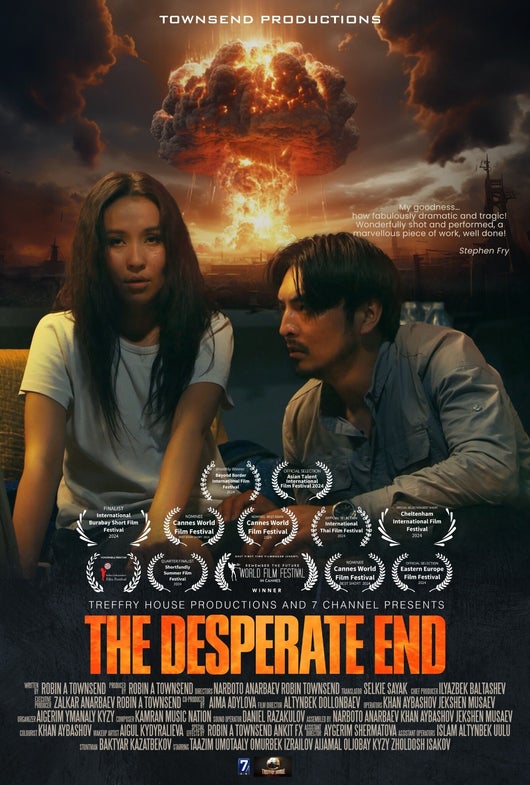
Despite receiving massive positive reviews, tens of thousands of views, and multiple wins and nominations at over 21 prestigious film festivals—including Los Angeles, India, Cannes, New York, Mexico—as well as honorable mentions from Thailand, Rome, and beyond—The Desperate End has been widely praised for its authentic storytelling and the real limitations short filmmakers face.
Yet, amid this global appreciation, one British film critic chose a nearly personal, hostile, and borderline discriminatory tone in their review. This raises a question: Is this a British cultural tendency to fear failure and respond with negativity, while American audiences and critics more readily embrace and celebrate success?
This film has created a valuable platform, enabling the telling of more powerful and diverse stories from underrepresented voices.
To counter the impact of such criticism, which can indeed be damaging, here is a brief statement affirming the film’s achievements and the importance of constructive, inclusive feedback.
Response to Key Criticisms from one British Reviewer.
Criticism:
-
Emotional swings between the couple are melodramatic and inconsistent.
-
Characters reveal painful truths in their final minutes, which seems unrealistic.
-
A gun appears suddenly without clear explanation.
-
The basement is empty despite other people being nearby, which lacks realism.
-
Military helicopters overhead are unrealistic for the situation.
-
The film tries to cram too much into a short runtime, causing pacing issues.
-
Narrative and character motivations are unclear or unbelievable.
-
Kyrgyzstan was chosen solely for budget reasons.
-
The filmmaker should “leave the writing to someone else” and stick to producing.
Response:
-
Emotional swings authentically reflect human responses to extreme crisis; real emotions are rarely steady or logical.
-
In moments of extreme vulnerability, people often confront hidden regrets and secrets, adding emotional depth and realism.
-
The gun is introduced at the start in an emergency backpack, reflecting common local safety practices in Kyrgyzstan and similar regions.
-
Large, lockable basements are common in post-Soviet countries where families often have private, secure spaces—unfamiliar to many UK viewers.
-
Helicopters are routinely used for crowd control and rapid response in many post-Soviet and Central Asian countries, making their presence authentic.
-
The short film format encourages bold storytelling and experimentation within limited time, which may affect pacing.
-
The narrative reflects complex human behavior and cultural realities rather than conventional character arcs.
-
Kyrgyzstan was chosen because the filmmakers were already there; it was a natural and authentic choice to tell this story.
-
Suggesting the filmmaker “leave the writing to someone else” is extremely unprofessional and poor practice. This dismissive personal judgment undermines unique voices, especially considering the filmmaker’s neurodivergence and disability. Such comments risk reinforcing stigma and exclusion and could be interpreted as discriminatory—something the creative industry must actively work to combat. Constructive feedback should foster growth and inclusivity.
The Desperate End Film 2025 — A Powerful Exploration of Fear and Human Connection
Rating: ★★★★★★★★☆☆ 8/10
Reviewed by The Film Lens
The Desperate End is a gripping and emotionally charged short film that showcases the remarkable storytelling potential of independent cinema. Filmed on location in Kyrgyzstan with a modest budget, the film offers an authentic and rarely seen glimpse into a moment of global crisis through a deeply personal lens.
What truly sets this film apart is its raw emotional honesty. The portrayal of a couple confronting the end of the world is both intimate and compelling, capturing the complexity of love, regret, and forgiveness under immense pressure. The performances deliver a heartfelt depth that brings the characters' struggles vividly to life.
The use of Kyrgyzstan’s unique cultural and architectural elements — particularly the large, secure basement — grounds the story in a tangible reality that adds layers of authenticity and intensity. The juxtaposition of tense, claustrophobic basement scenes with the broader chaos unfolding outside effectively draws the viewer into both the personal and public facets of crisis.
Technically, the film impresses with its atmospheric cinematography and sound design, especially considering the tight budget and logistical challenges of shooting internationally. The dedication of the cast and crew shines through in every frame.
While the film’s emotional intensity sometimes leads to rapid shifts that might feel heightened for some viewers, this serves to underline the unpredictability and turmoil inherent in such dire circumstances. A few narrative elements, like the introduction of certain props, could benefit from fuller context, but they add to the film’s sense of unpredictability and real-world tension.
Overall, The Desperate End is a testament to what passionate filmmakers can achieve with limited resources — a bold, poignant film that resonates on both an emotional and cultural level.
The Desperate End (2025) - IMDb
filmthreat.com/reviews/the-desperate-end/
The Desperate End (2025) - Trailer, Cast & Reviews - Mabumbe

